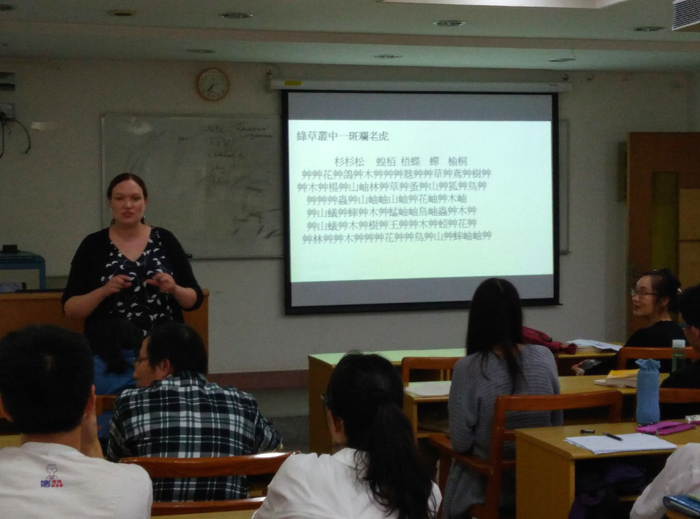
Home >
News & Events >
FLS News
“A Sandwich of Heroes, an Excellency of Ants”: Jennifer Feeley talks literary translation at FLS
Last updated:2016-04-18
On the evening of 11 April, American literary translator Jennifer Feeley spoke to a full room in the School of Foreign Languages. Her new book of translated poems by the Hong Kong writer Xi Xi, Not Written Words (published by Zephyr Press, 2016), took center stage, and Feeley led a lively conversation in which she invited audience members to attempt to translate some of Xi Xi’s whimsical, wordplay-driven poetry themselves.
Literary translation, Feeley pointed out, is an act of creative writing. Though the Chinese-language author created the originals, the translated poems are entirely the handiwork of the translator. Holding up her dog-eared copy of Not Written Words, she said, “This is 100% my words, even though the ideas aren't mine.”
And in the case of Xi Xi, huge reserves of creativity were required. Though few audience members had heard of her, Xi Xi is one of Hong Kong's most beloved authors. She is known mainly as a fiction writer, with her poems having gone out of print, but her hallmark is a fey playfulness, like that of a mischievous child. Her pen name, Xi Xi (西西 in Chinese characters) she chose because it resembles, to her, a little girl playing hopscotch.
That made translating her poetry—full of wordplay and clever games with language—a tall order. Feeley likes a challenge, though, and gamely took the audience through a number of the original poems, asking them to point out why it might be difficult to get their particular qualities to transfer into a poem in English.
With a poem called “Murray Building,” she guided audience members in pointing out that the whole thing hinges on the idea that in Cantonese and Mandarin the name of the building sounds similar to the word for “beautiful.” The speaker lives in the famously squalorous Murray Building in Hong Kong, and a beloved is sending her letters there, always misspelling the name so that it is addressed to, ironically, the “Beautiful Building.”
Few words in English that mean “beautiful” could be confused with “Murray,” however. Feeley's solution, after long thought, was to use the slightly different word “merry,” meaning joyous. And in fact the replacement worked quite well, giving the poem a distinctively playful air, especially since, in American English, “merry” is almost never used except in the phrase “Merry Christmas.”
More difficult was a concrete poem of characters depicting a forest with a tiger, in the form of the character王 (king), its horizontal lines evoking the tiger’s stripes, hiding deep within. Creating a new poem in English that had some of the same feeling was a difficult process—how could Feeley evoke the tiger without having a character like that to use?—but she was inspired by a Chinese writer who writes in English and often uses anagrams. In the end, “a striped tiger” is manifested in the poem as the anagram “it sit deep grr,” a clever, childlike little phrase nested in a sea of brush and trees.
The piece de resistance, though, was a poem that relied for its effect in Chinese on measure words: Snowflakes, heroes, scallions, cabbage, umbrellas, and other objects were referred to with measure words used usually for animals or things of a different character entirely, producing an ironic effect. In English, there are far fewer measure words than in Chinese, and using them unconventionally doesn't produce the same sense of cognitive dissonance. Feeley let the audience hang in suspense for many long minutes, eliciting people's thoughts on how the same effect could be generated in English. It seemed impossible—but in the end, when she finally showed her versions, there were bursts of laughter and amazement from the audience. 一亩阿华田 appeared as “an ovum of Ovaltine.” 一家猪猡 had become “a hamlet of hams.” 一位蚂蚁 was “an excellency of ants.”
In a way, Feeley said, “this poem made me think of the absurdity of my own language.” It also suggested to her the rich possibilities of using the wrong measure words in Chinese as a form of play. “It made me think,” she said, “that more novice Chinese speakers should try writing poetry.”
It makes me think,” she said with a smile, “that novice write poems!”
Written by: Austin Woerner
